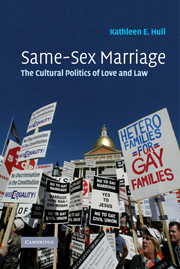Book contents
- Frontmatter
- Contents
- List of tables
- Preface
- Same-sex marriage timeline
- 1 Marriage, culture and law
- 2 Doing the rite thing: cultural practices of commitment
- 3 How do I love thee? Questioning the marriage model
- 4 Making it legal: marriage, law and legality
- 5 Sin or civil right? Debating marriage in the states
- 6 Conclusion: marriage and beyond
- Epilogue
- Appendix A Interview guides
- Appendix B Sample characteristics
- Appendix C Study participants
- Notes
- Court cases
- References
- Index
5 - Sin or civil right? Debating marriage in the states
Published online by Cambridge University Press: 05 June 2012
- Frontmatter
- Contents
- List of tables
- Preface
- Same-sex marriage timeline
- 1 Marriage, culture and law
- 2 Doing the rite thing: cultural practices of commitment
- 3 How do I love thee? Questioning the marriage model
- 4 Making it legal: marriage, law and legality
- 5 Sin or civil right? Debating marriage in the states
- 6 Conclusion: marriage and beyond
- Epilogue
- Appendix A Interview guides
- Appendix B Sample characteristics
- Appendix C Study participants
- Notes
- Court cases
- References
- Index
Summary
In our system of government, civil rights violations are remedied by courts, not because we issue “Holy Writ” or because we are “the only repository of wisdom” … It is because the courts “must ultimately define and defend individual rights against government in terms independent of consensus or majority will.”
– Baker v. State of Vermont, opinion of Justice Denise JohnsonGod's Law, Not Man's Law.
– Sign at Vermont public hearing on same-sex marriage, January 25, 2000Previous chapters provided a close look at same-sex marriage from the perspective of ordinary same-sex couples, considering how these couples think about marriage as a legal and political issue and sometimes enact marriage through various cultural practices. This chapter widens our perspective to examine recent public debates over the policy question of legal recognition of same-sex marriage. How, if at all, should the state recognize intimate same-sex commitments? I scrutinize the public debates in two pivotal states: Hawaii and Vermont. These were the first states in the nation to wrestle with the policy question of same-sex marriage over an extended period of time. Hawaii was the first state to come close to granting legal recognition for same-sex marriage, and also the first (along with Alaska) to pass a state constitutional amendment to prevent such recognition. Vermont's experience closely parallels Hawaii's in some key respects but diverges from the Hawaii case in terms of how policymakers ultimately resolved the issue.
- Type
- Chapter
- Information
- Same-Sex MarriageThe Cultural Politics of Love and Law, pp. 152 - 195Publisher: Cambridge University PressPrint publication year: 2006



